Andrew Bonar Law Worksheets
Do you want to save dozens of hours in time? Get your evenings and weekends back? Be able to teach about Andrew Bonar Law to your students?
Our worksheet bundle includes a fact file and printable worksheets and student activities. Perfect for both the classroom and homeschooling!
Resource Examples
Click any of the example images below to view a larger version.
Fact File
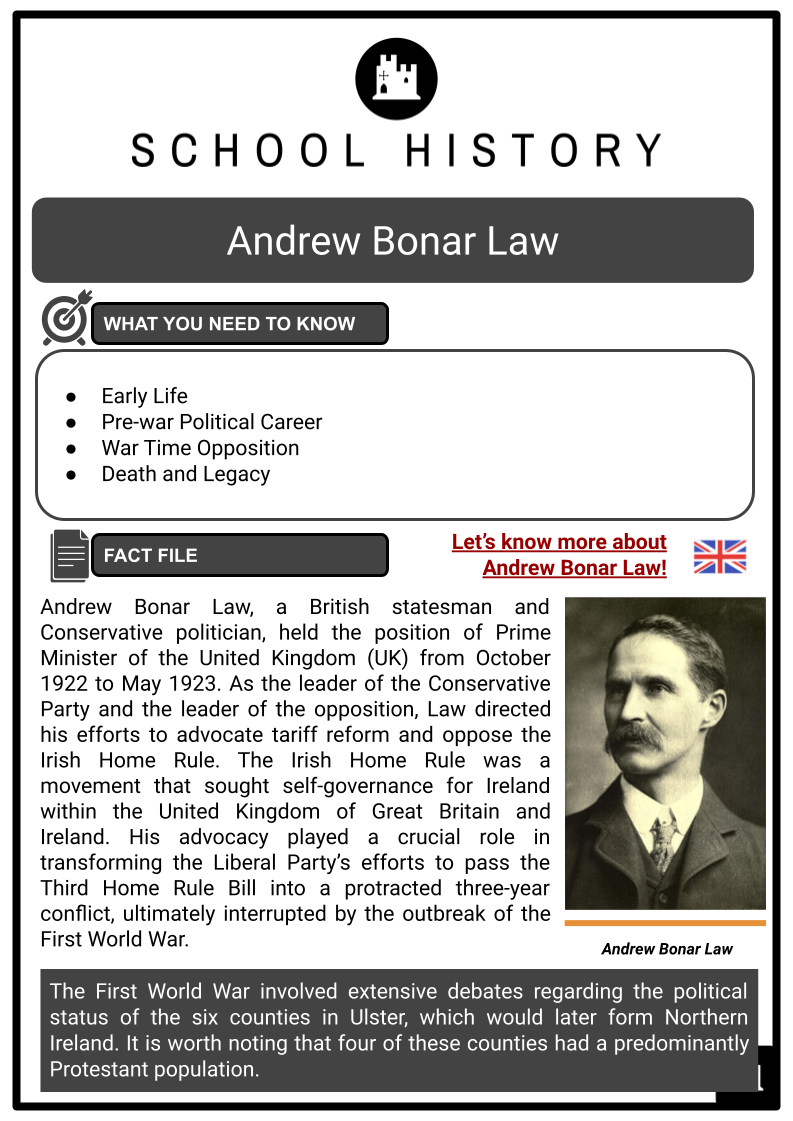
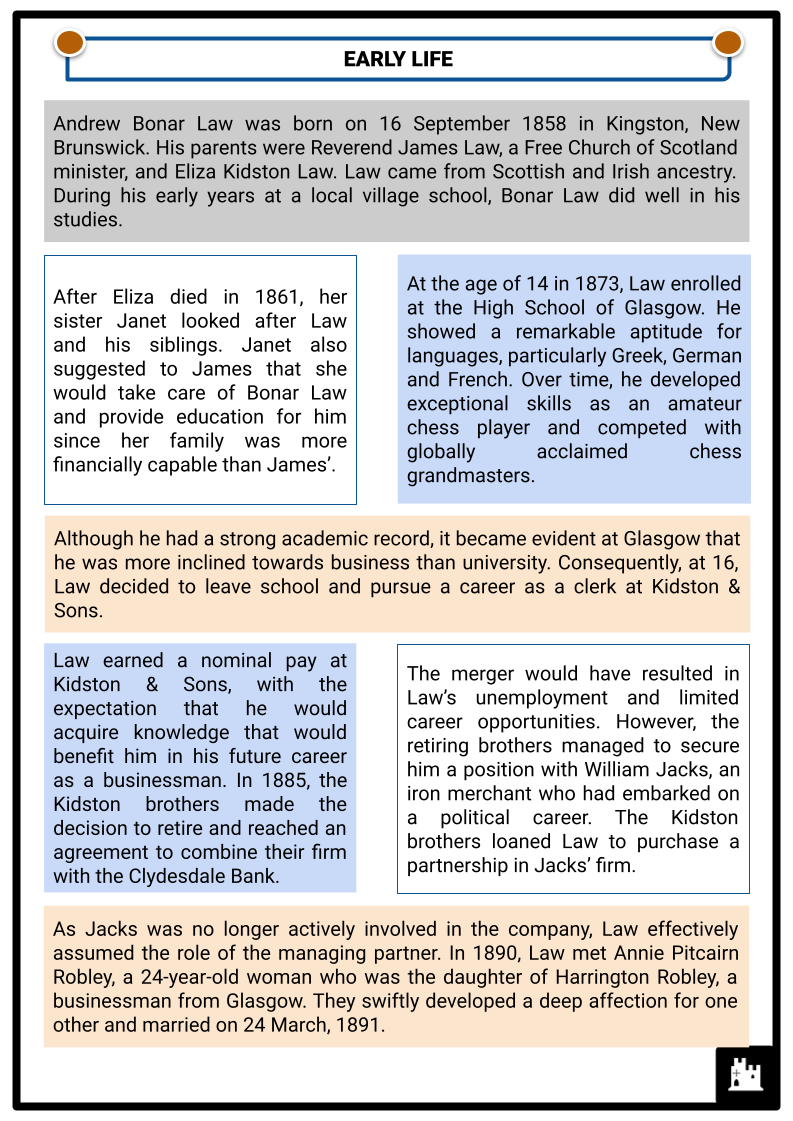
Student Activities
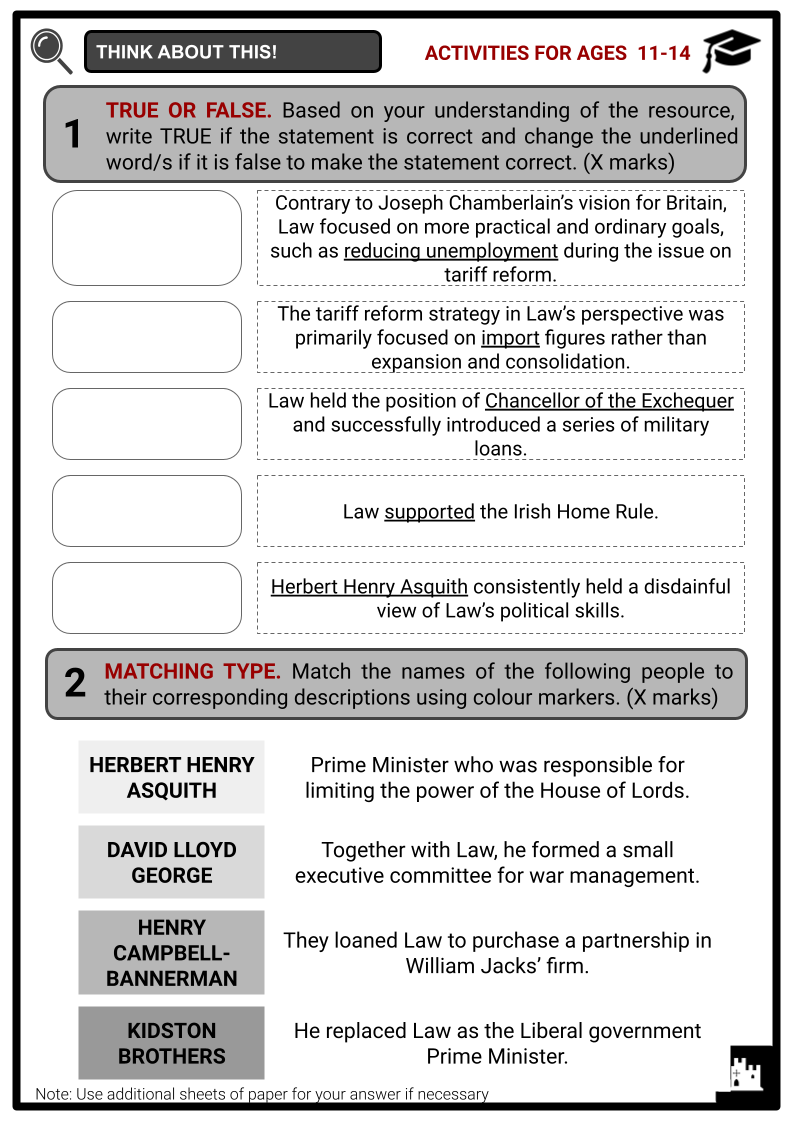
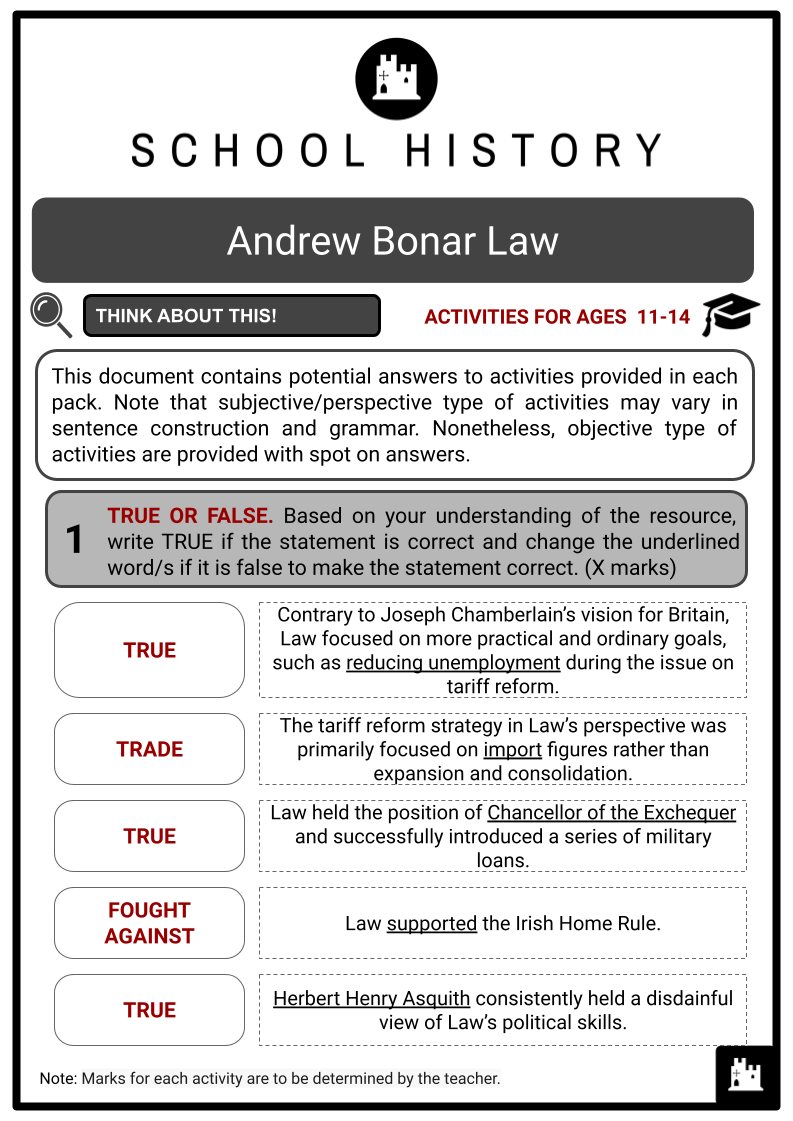
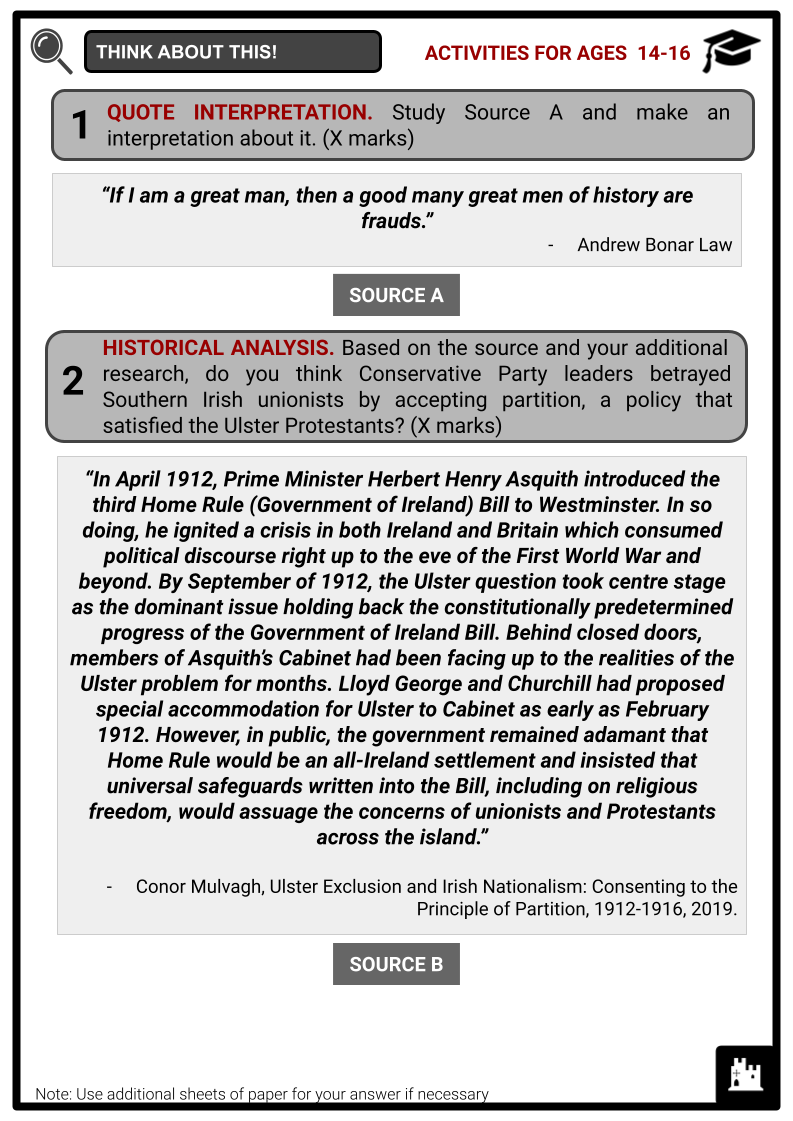
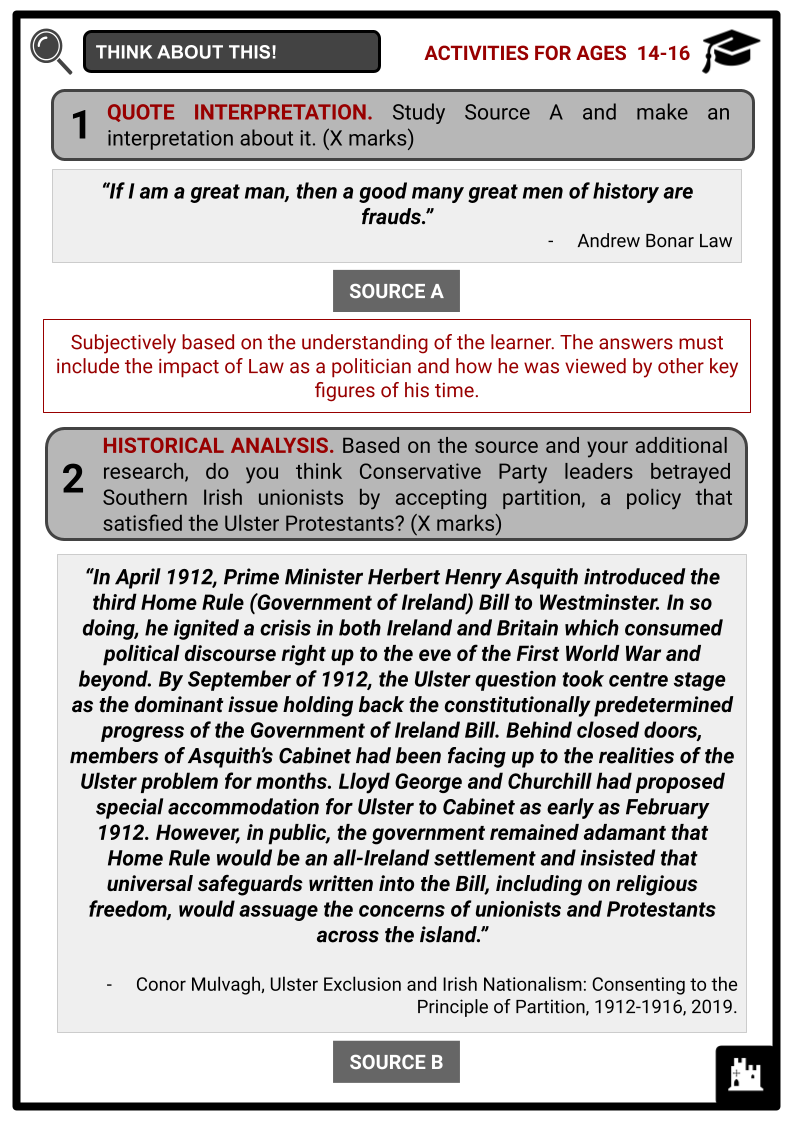
Summary
- Early Life
- Pre-war Political Career
- War Time Opposition
- Death and Legacy
Key Facts And Information
Let’s know more about Andrew Bonar Law!
Andrew Bonar Law, a British statesman and Conservative politician, held the position of Prime Minister of the United Kingdom (UK) from October 1922 to May 1923. As the leader of the Conservative Party and the leader of the opposition, Law directed his efforts to advocate tariff reform and oppose the Irish Home Rule. The Irish Home Rule was a movement that sought self-governance for Ireland within the United Kingdom of Great Britain and Ireland. His advocacy played a crucial role in transforming the Liberal Party’s efforts to pass the Third Home Rule Bill into a protracted three-year conflict, ultimately interrupted by the outbreak of the First World War.
The First World War involved extensive debates regarding the political status of the six counties in Ulster, which would later form Northern Ireland. It is worth noting that four of these counties had a predominantly Protestant population.
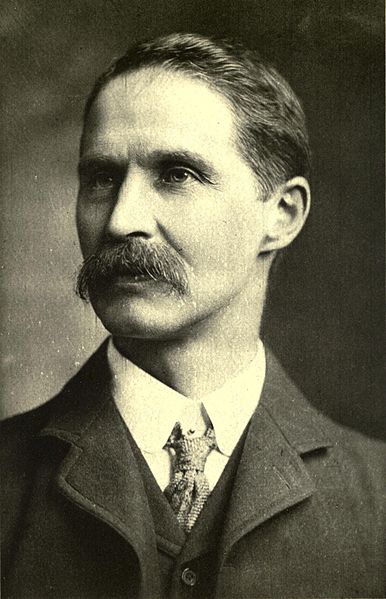
EARLY LIFE
- Andrew Bonar Law was born on 16 September 1858 in Kingston, New Brunswick. His parents were Reverend James Law, a Free Church of Scotland minister, and Eliza Kidston Law. Law came from Scottish and Irish ancestry. During his early years at a local village school, Bonar Law did well in his studies.
- After Eliza died in 1861, her sister Janet looked after Law and his siblings. Janet also suggested to James that she would take care of Bonar Law and provide education for him since her family was more financially capable than James’.
- At the age of 14 in 1873, Law enrolled at the High School of Glasgow. He showed a remarkable aptitude for languages, particularly Greek, German and French. Over time, he developed exceptional skills as an amateur chess player and competed with globally acclaimed chess grandmasters.
- Although he had a strong academic record, it became evident at Glasgow that he was more inclined towards business than university. Consequently, at 16, Law decided to leave school and pursue a career as a clerk at Kidston & Sons.
- Law earned a nominal pay at Kidston & Sons, with the expectation that he would acquire knowledge that would benefit him in his future career as a businessman. In 1885, the Kidston brothers made the decision to retire and reached an agreement to combine their firm with the Clydesdale Bank.
- The merger would have resulted in Law’s unemployment and limited career opportunities. However, the retiring brothers managed to secure him a position with William Jacks, an iron merchant who had embarked on a political career. The Kidston brothers loaned Law to purchase a partnership in Jacks’ firm.
- As Jacks was no longer actively involved in the company, Law effectively assumed the role of the managing partner. In 1890, Law met Annie Pitcairn Robley, a 24-year-old woman who was the daughter of Harrington Robley, a businessman from Glasgow. They swiftly developed a deep affection for one other and married on 24 March, 1891.
PRE-WAR POLITICAL CAREER
- Despite the scheduled election being set for 1902, the Conservative administration was compelled to hold a general election in 1900 due to the circumstances arising from the Second Boer War. This particular election came to be known as the khaki election. The Second Boer War was a military conflict that took place between the British Empire and the two Boer republics, namely the South African Republic and the Orange Free State.
- The war was primarily driven by the British Empire’s desire to expand its control and dominance in Southern Africa. The campaign was marked by hostility from both anti- and pro-war advocates, who engaged in vigorous disputes.
- However, Law stood out with his skills. On 4 October 1900, Law was re-elected to Parliament with a majority of 1,000, which was a significant increase compared to Andrew Provand’s previous majority of 381.
Tariff Reform
- Law had the opportunity to make a significant impact when the question of tariff reform arose. In order to finance the expenses incurred during the Second Boer War, Chancellor of the Exchequer Michael Hicks Beach proposed the implementation of import duties or tariffs on foreign metal, wheat and grain entering Britain.
- Prior to this, tariffs were in place in Britain, but they were eliminated in the 1870s due to the influence of the free trade movement. An import duty was imposed on maize. The matter became highly contentious, causing a deep division within the British political sphere.
- This division persisted even after the retirement of Robert Gascoyne-Cecil, 3rd Marquess of Salisbury, who was subsequently succeeded as prime minister by his nephew, Arthur Balfour.
- Law capitalised on this opportunity by delivering his inaugural address on 22 April 1902, wherein he contended that although he deemed a comprehensive tariff unnecessary, an imperial customs union was a favourable proposition, especially considering the escalating tariffs implemented by other countries like Germany and the United States.
- Due to Law’s established expertise in business affairs and his proficiency as an economic representative for the government, Balfour extended an offer to him for the role of Parliamentary Secretary to the Board of Trade when he established his government. Law agreed to the offer and was officially appointed on 11 August 1902.
- The speech and its ideas caused a division inside the Conservative Party and its coalition partner, the Liberal Unionist Party, resulting in two factions – the Free Fooders, who advocated for free trade, and the Tariff Reformers, who supported Colonial Secretary Joseph Chamberlain’s proposed tariff reforms.
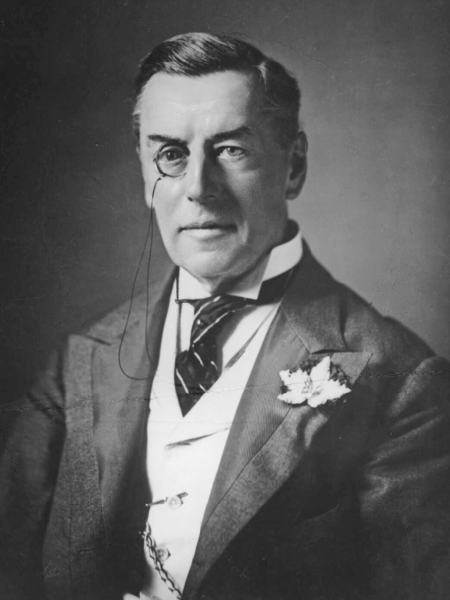
- Law was a committed advocate for tariff reform. However, while Chamberlain envisioned a prosperous future for Britain, Law prioritised more practical and ordinary objectives, such as decreasing unemployment.
- Leopold Charles Maurice, a Conservative politician, stated that for Law, the tariff reform programme was primarily concerned with trade figures and not with the broader national and Imperial agenda of development and consolidation, in which commerce was only seen as an economic component.
- The residents of Blackfriars, who formed the support base for Law, did not show great enthusiasm for tariff reform. This was because Glasgow, a disadvantaged region during that period, had experienced positive effects from free trade.
- Within the parliamentary setting, Law demonstrated exceptional diligence in advocating for tariff reform. He consistently delivered speeches in the House of Commons and successfully outperformed renowned debaters as Winston Churchill, Charles Dilke and Herbert Henry Asquith, who served as the former home secretary and ultimately became the prime minister.
- Following his appointment, the Liberal Henry Campbell-Bannerman promptly disbanded Parliament. Law’s seat was lost in the subsequent general election, despite vigorous campaigning and a visit by Arthur Balfour.
- Altogether, the Conservative Party and Liberal Unionists experienced a loss of 245 seats, resulting in a remaining count of only 157 members of parliament. The bulk of these parliamentarians were advocates of tariff reform.
- Although Law suffered a defeat, his value to the Conservatives was so significant at this point that they promptly made an attempt to reinstate him in Parliament. Frederick Rutherfoord Harris, the Member of Parliament for the secure Conservative constituency of Dulwich, saw an opportunity with his retirement.
- Law was re-elected to Parliament in the subsequent by-election, augmenting the Conservative majority to 1,279. In July 1906, just after celebrating his 70th birthday, Joseph Chamberlain suffered a stroke, which compelled him to withdraw from public life, dealing a significant setback to the party.
- Joseph’s son, Austen Chamberlain, took over as the leader of the tariff reformers after him. Despite having previous experience as Chancellor of the Exchequer and being enthusiastic about tariff reform, Austen Chamberlain was not as proficient a speaker as Law.
- Consequently, Law became a member of Balfour’s Shadow Cabinet, assuming the role of the leading advocate for tariff reform.
- Law’s wife died on 31 October 1909, which caused him to use work as a coping mechanism for loneliness.
House of Lords
- In April 1908, Campbell-Bannerman stepped down from his position as prime minister and was succeeded by Asquith. In 1909, Asquith and his Chancellor of the Exchequer, David Lloyd George, implemented the People’s Budget. This budget aimed to redistribute income and finance social reform initiatives by raising direct and indirect taxes.
- According to parliamentary convention, the House of Lords does not question or dispute financial and budget bills. However, in this particular situation, the Lords, primarily Conservative and Liberal Unionists, declined the bill on 30 April, triggering a constitutional crisis.
- In January 1910, the Liberals announced a general election. During the months leading up to the election, Law dedicated most of his time to campaigning around the country for other Unionist candidates and Members of Parliament (MPs). He was certain that his Dulwich seat would remain secure.
- Law secured a more significant majority of 2,418 votes. The Liberals retained their position in government with the backing of the Irish Parliamentary Party. The House of Commons reapproved the Budget and endorsed it by the House of Lords without any opposition, as it had gained an election mandate.
WAR TIME OPPOSITION
- Before the German ultimatum to Belgium in July 1914, Law discreetly conveyed to Prime Minister Asquith that the Conservative Party favoured participating in the war. Over the following eight months, the Conservative Party faced challenges as they lacked trust in the Liberal government but refrained from publicly expressing their concerns for patriotic reasons.
- In May 1915, they formed a coalition government led by Asquith, although the Liberal Party still held the most important positions. Law assumed the role of Colonial Secretary, which was considered less significant during the war.
- Asquith consistently held a contemptuous opinion of Law’s capabilities and intentionally assigned a more significant role to his predecessor, Arthur Balfour, the Conservative Party’s leader.
- Over the following eighteen months, Law backed the implementation of conscription and gradually became less confident in Asquith’s ability to rule during conflict.
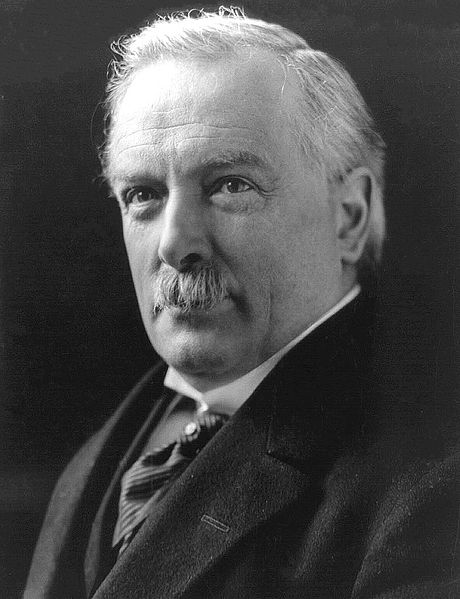
- His dedication to endorsing David Lloyd George’s strategy to marginalise Asquith played a pivotal role in Asquith’s resignation and Lloyd George’s appointment as Prime Minister in December 1916.
- Law collaborated closely and harmoniously with Lloyd George throughout the rest of the war. His backing was crucial for Lloyd George’s political stability, and one of his primary responsibilities was overseeing the operations of the House of Commons.
- Law also served as the Chancellor of the Exchequer and implemented a series of prosperous war loans that funded a significant portion of Britain’s war expenses.
- Law was a member of the compact War Cabinet, but he did not attempt to exert influence over military strategy. Following the conclusion of the war, he advocated for the continuation of the coalition and played a crucial role in its preservation until his retirement in May 1921 due to health reasons.
- Subsequently, policy failures resulted in an increasing uprising within the Conservative Party against maintaining the coalition under Lloyd George in the upcoming general election. However, Austen Chamberlain, the successor to Law as leader, disregarded this sentiment.
- In October 1922, as the situation reached a critical point, the fear of a permanent division within the Conservative Party led to Bonar Law reluctantly coming out of retirement. This played a crucial role in Lloyd George’s collapse. Law assumed the position of Prime Minister and secured a majority in the general election of November 1922.
- Several prominent Conservatives, including Balfour, Austen Chamberlain and Robert Horne, were not part of the new Cabinet formed by Law. Despite their small size, the Coalition Conservatives aimed to exert significant influence over any future Coalition administration, drawing parallels to the Peelite group’s dominance during the Coalition administration of 1852–1855, a comparison frequently made during that period.
- Concerns were raised regarding whether Horace Farquhar, 1st Earl Farquhar, the elderly Treasurer of the Conservative Party, had transferred any funds intended for the party to Lloyd George, who had accumulated a significant amount of money, mainly through the selling of honours during his time as Prime Minister.
- The Coalition Conservatives also aimed to secure financial support from Farquhar, a member of the Conservative Party. Law deemed Farquhar mentally incapacitated and incapable of adequately explaining the situation. Hence, he terminated his services.
- Law’s brief government faced the challenging issue of inter-Allied war debts. Britain had a debt to the US, and in return, France, Italy and other Allied powers owed Britain four times as much money. However, the Lloyd George government, led by Balfour, had assured that Britain would only collect enough money from the other Allies to repay the United States.
- Repaying the debt was challenging because trade had not yet recovered to its prewar levels, and exports were necessary to earn foreign currency. During a visit to the United States, Stanley Baldwin, who had little experience as Chancellor of the Exchequer, agreed to repay £40 million per year to the United States instead of the originally estimated £25 million.
- Upon his return, Law announced this agreement to the press as soon as his ship docked in Southampton, before the Cabinet had an opportunity to review it. Law considered resigning but was persuaded not to by top ministers. He expressed his emotions in an anonymous letter to The Times.
DEATH AND LEGACY
- Law was promptly diagnosed with incurable throat cancer and, due to his inability to speak in Parliament, resigned on 20 May 1923. King George V summoned Baldwin, who was reportedly preferred by Law over George Curzon, the 1st Marquess Curzon of Kedleston. Nevertheless, Law refrained from providing any counsel to the King. Law passed away in London later that year at the age of 65.
- Bonar Law held the position of prime minister for the shortest duration among all prime ministers in the 20th century. He is commonly known as ‘the unknown prime minister’. Despite not witnessing their realisation, his endeavours from 1916 to 1923 resulted in restoring and strengthening the Conservative Party’s supremacy in British politics. Additionally, his efforts led to a new two-party system, with the Labour Party replacing the Liberals as the primary left-of-centre alternative.
Frequently Asked Questions
- Who was Andrew Bonar Law?
Andrew Bonar Law served as Prime Minister of the United Kingdom from 1922 to 1923.
- What role did Andrew Bonar Law play in World War I?
During World War I, Bonar Law served as Chancellor of the Exchequer in David Lloyd George's coalition government.
- How long was Bonar Law Prime Minister?
Bonar Law served as Prime Minister for just 211 days, from October 1922 to May 1923.
